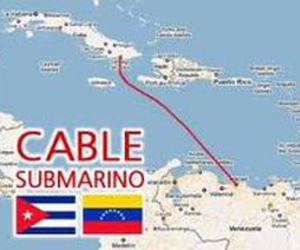Chavez Beats AT&T to Cuban Market Over Price Dispute
- Submitted by: manso
- Editorial Articles
- 01 / 27 / 2011

January 26, 2011, 1:09 PM EST. Jan. 26 (Bloomberg) -- A pricing dispute between the U.S. and Cuba may have cost American companies including AT&T Inc. and Verizon Communications Inc a foothold in the island’s recently opened telecommunications market.
Paris-based Alcatel-Lucent SA on Jan. 22 began laying a $70 million, 1,600-kilometer (1,000-mile) underwater fiber-optic cable between Venezuela and the city of Siboney on Cuba’s southeastern coast. Venezuelan President Hugo Chavez heralded the subsea link as a way to break the half-century-old U.S. “blockade” of Cuba.
U.S. companies had been backing a separate venture by Miami-based TeleCuba Communications Inc, which said it was granted a license to build a 110-mile link from Key West, Florida, to Havana after President Barack Obama in 2009 loosened the U.S. trade embargo for phone service providers. The project has been delayed over the Federal Communications Commission’s refusal to accept price demands by President Raul Castro’s government for routing calls.
“This is a huge missed opportunity,” said Chris Sabatini, senior policy director at the New York-based Council of the Americas, a business group. “If you can get into a market early on, you can control it all along the value chain.”
Cuba’s population of 11.4 million could become the largest telecom market in the Caribbean, topping Puerto Rico’s $1.6 billion market, according to Pyramid Research in Cambridge, Massachusetts. Even if the market remains mostly closed, annual revenue could still reach $400 million by 2013 from the current $80 million, Pyramid said.
‘Decrease Dependency’
In an April 2009 memorandum, Obama, 49, directed the U.S. government to allow companies to provide communications services to Cuba, saying it would “decrease dependency of the Cuban people.”
Five months later, TeleCuba said it was awarded a license by the Treasury Department, which oversees enforcement of the embargo, to build a fiber-optic cable. At the time, TeleCuba said it hoped to have the $18 million high-speed link operational by the second quarter of 2011. The company, which sells calling cards to Cuban-Americans, also wants to provide roaming service in Cuba for U.S.-based cell phones.
To move forward on the project, TeleCuba’s vice president for public relations, Lilibeth Gonzalez, said it is “imperative” the FCC waive rules setting a maximum rate of 60 cents per minute that a U.S. provider can pay Cuba for connecting calls. TeleCuba, in an FCC filing, requested the rate be boosted to 84 cents per minute.
FCC Petition
“We filed a petition for waiver with the FCC in March 2010 that we believe is directly in line with Obama’s directives,” Gonzalez said in an e-mailed statement. “While we have been waiting, the Venezuelan government has been diligently working on its own fiber-optic project.”
Dallas-based AT&T and New York-based Verizon have both supported TeleCuba’s petition. In a filing submitted to the FCC in June, Verizon’s lawyers argued that the waiver would “facilitate a greater exchange of information and increased communications by allowing domestic carriers to investigate the re-establishment of a relationship with Cuban providers and/or the construction of potential facilities on the United States- Cuba route.”
Mark Siegel, an AT&T spokesman, declined in an interview to comment. Verizon spokeswoman Linda Laughlin said the company doesn’t offer any direct services to Cuba.
‘Committed’ to Action
“The commission is committed to taking action on the TeleCuba request as well as continuing to move forward on all filings related to the new Cuba telecommunications policy,” David Fiske, an FCC spokesman, said in a telephone interview from Washington.
Cuba, which will have the last remaining state-run telecommunications monopoly in Latin America after private companies start operating in Costa Rica this year, has the lowest mobile-phone penetration in the region, according to the United Nations’ International Telecommunications Union.
As recently as 2008, there were between 20,000 and 30,000 mobile phones on the Caribbean island, most of them owned by foreign diplomats and senior Cuban officials. That has grown to 800,000 since the 79-year-old Raul Castro in 2008 lifted a ban on most people owning them, according to the Cuba Study Group, which is made up of U.S. businesses that support more open commercial ties with Cuba.
‘Gold Mine’
“Cuba is the gold mine everyone is after in Latin America,” Jose Magana, a senior analyst at Pyramid, said in a phone interview. “Pressure will build on the U.S. government to let U.S. companies participate in the opening of Cuba’s market.”
Bandwidth in Cuba can reach a maximum of about 2 megabytes per second, compared with a U.S. average of 5 megabytes and more than 12 megabytes in South Korea, Magana said.
Cuban state phone company Empresa de Telecomunicaciones de Cuba S.A., or Etecsa, has a monopoly on all fixed-line and mobile services. Milan-based Telecom Italia SpA has a 27 percent stake in the Havana-based company.
The 56-year-old Chavez calls former President Fidel Castro, 84, a father figure and sends about 100,000 barrels of oil a day to Cuba. On Jan. 15 he said that the new link will bring the countries even closer and benefit private Venezuelan companies.
Chavez in 2007 paid investors including Verizon, which owned a 28.5 percent stake, $1.3 billion to nationalize Compania Anonima Nacional Telefonos de Venezuela, or Cantv.
Restrictions Eased
Obama’s easing of telecommunications restrictions toward Cuba ”did not go far enough” and contains ”contradictory” elements, said Tomas Bilbao, executive director of the Cuba Study Group.
“No U.S. company has found it attractive to try to make that type of investment,” Bilbao said in a phone interview,“The void left by U.S. sanctions has provided a perfect opportunity for Hugo Chavez to save the day.”
Source: bloomberg.net.
Comments